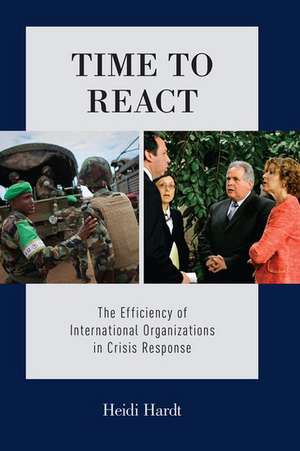Time to React: The Efficiency of International Organizations in Crisis Response
Autor Heidi Hardten Limba Engleză Paperback – 26 ian 2017
| Toate formatele și edițiile | Preț | Express |
|---|---|---|
| Paperback (1) | 182.95 lei 10-16 zile | |
| Oxford University Press – 26 ian 2017 | 182.95 lei 10-16 zile | |
| Hardback (1) | 550.85 lei 10-16 zile | |
| Oxford University Press – 26 feb 2014 | 550.85 lei 10-16 zile |
Preț: 182.95 lei
Preț vechi: 237.24 lei
-23% Nou
Puncte Express: 274
Preț estimativ în valută:
35.01€ • 36.64$ • 29.14£
35.01€ • 36.64$ • 29.14£
Carte disponibilă
Livrare economică 26 februarie-04 martie
Preluare comenzi: 021 569.72.76
Specificații
ISBN-13: 9780190655907
ISBN-10: 0190655909
Pagini: 266
Ilustrații: 13 illustrations
Dimensiuni: 234 x 155 x 15 mm
Greutate: 0.4 kg
Editura: Oxford University Press
Colecția OUP USA
Locul publicării:New York, United States
ISBN-10: 0190655909
Pagini: 266
Ilustrații: 13 illustrations
Dimensiuni: 234 x 155 x 15 mm
Greutate: 0.4 kg
Editura: Oxford University Press
Colecția OUP USA
Locul publicării:New York, United States
Recenzii
This important book looks at the informal norms and networks governing the way international organizations 'really' work. Drawing on an impressive array of interviews and survey data, Hardt shows persuasively how much we miss when we ignore the personal ties and trust that are essential to decisions in a crisis. Interpersonal relationships and organizational culture can trump formal rules in ways that help get things done. Essential reading for anyone interested in when and why international organizations work well (or don't).
Timely intervention in civil conflicts can save lives, but some regional organizations are able to respond to crisis more quickly than others. In Time to React, Heidi Hardt advances a convincing and highly original explanation for this record: informal organizational norms and interpersonal ties.
The findings described in the book challenge the realist view of international relations. Hardt makes the case that humans, even diplomats, are social creatures, and interpersonal dynamics, rather than national interest alone, can influence the timeliness of a multinational response to crisis.
Timely intervention in civil conflicts can save lives, but some regional organizations are able to respond to crisis more quickly than others. In Time to React, Heidi Hardt advances a convincing and highly original explanation for this record: informal organizational norms and interpersonal ties.
The findings described in the book challenge the realist view of international relations. Hardt makes the case that humans, even diplomats, are social creatures, and interpersonal dynamics, rather than national interest alone, can influence the timeliness of a multinational response to crisis.
Notă biografică
Heidi Hardt is Assistant Professor of Political Science at the University of California, Irvine.

